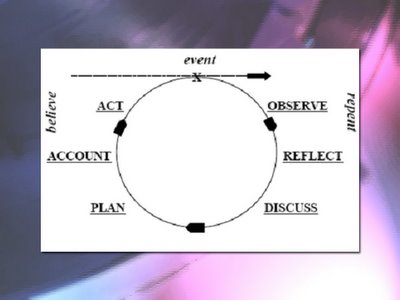Little Scratches
 For those of you that remember records and record players, a little scratch, almost invisible to the eye, can hamper a beautiful piece of music. Same with a little scratch on DVD.
For those of you that remember records and record players, a little scratch, almost invisible to the eye, can hamper a beautiful piece of music. Same with a little scratch on DVD.Imagine that you drew a line on a whiteboard, from one end of it to the other. You then extended the line off the board until it passed through both of the walls on either side of the room and stretched unseen into the distance. That is what eternity is like. Eternity, like the line, is forever extending in both directions with no end in sight.
To contrast the longevity of our earthly existence with that line of eternity, I would take out a felt and draw a scratch on the extended line. That scratch mark (about 1/32 of an inch) represents how long our life on earth is in comparison with eternity. Not very long at all!
Your life is but a scratch on the continuum of eternity, as it stretches from the past and moves to the future.
Now imagine you drew another line representing the entirety of your own life.
Any one event, situation or incident in the continuum of your own life is also but a little scratch upon that timeline.
What do most people do? They not only live on that scratch, but they also love that scratch. They kiss the scratch. They save for that scratch. They save for that scratch. They live scratch lives, have scratch businesses, and have scratch families with scratch dreams and scratch hopes.
Too often we focus strictly on our own little scratch, worshipping it, idolizing it, all the while missing the point that it’s only a small scratch in the giant scheme of life.
We also cling to the little scratches in our own life. Minor events in the greater scheme of a 70-80 year lifespan become tyrants that rule our very existence. We get too preoccupied with these ‘little scratches’.
God so loved that scratch that He sent His only Son to die for those who live there. Yet many still don't know that this gift called eternal life starts now. They're still hanging onto the scratch. They try to lengthen it, stretch it and extend it as much as possible. But even in the midst of their attempts, they know deep inside that there's got to be something more.
What we need is a 'reflective cycle' to help gain the big picture and find healing and meaning for those 'little scratches'.
 Mike Breen in his book A Passionate Life shares one example of a reflective cycle as shown in the picture. A refective cycle helps us break free from monotonous living in order to fully experience life.
Mike Breen in his book A Passionate Life shares one example of a reflective cycle as shown in the picture. A refective cycle helps us break free from monotonous living in order to fully experience life.
The EVENT:
A CHRONOS Moment: Time marches on.
Most people are so busy reacting to the needs of daily life that they're happy just to be getting through the day. It's hard to make sense of life when it revolves around daily crises and you're always feeling overwhelmed. By taking the time to understand events and happenings, you'll open up more time and space, have more energy, and be more focused.
A KAIROS Moment: When time stands still.
OUR CHOICE: We can deny Life, or we can LEARN from Life.
The apostle Paul developed a refective cycle in his own life, as evidenced by the passages below.
Acts 17:26-28
From one man he made every nation of men, that they should inhabit the whole earth; and he determined the times set for them and the exact places where they should live. God did this so that men would seek him and perhaps reach out for him and find him, though he is not far from each one of us. 'For in him we live and move and have our being.' As some of your own poets have said, 'We are his offspring.'
Acts 20:24
But my life is worth nothing unless I use it for doing the work assigned me by the Lord Jesus--the work of telling others the Good News about God's wonderful kindness and love.
Acts 22:3-22
"I am a Jew, born in Tarsus, a city in Cilicia, and I was brought up and educated here in Jerusalem under Gamaliel. At his feet I learned to follow our Jewish laws and customs very carefully. I became very zealous to honor God in everything I did, just as all of you are today. And I persecuted the followers of the Way, hounding some to death, binding and delivering both men and women to prison. The high priest and the whole council of leaders can testify that this is so. For I received letters from them to our Jewish brothers in Damascus, authorizing me to bring the Christians from there to Jerusalem, in chains, to be punished.
"As I was on the road, nearing Damascus, about noon a very bright light from heaven suddenly shone around me. I fell to the ground and heard a voice saying to me, `Saul, Saul, why are you persecuting me?'
`Who are you, sir?' I asked. And he replied, `I am Jesus of Nazareth, the one you are persecuting.' The people with me saw the light but didn't hear the voice.
"I said, `What shall I do, Lord?' And the Lord told me, `Get up and go into Damascus, and there you will be told all that you are to do.'
"I was blinded by the intense light and had to be led into Damascus by my companions. A man named Ananias lived there. He was a godly man in his devotion to the law, and he was well thought of by all the Jews of Damascus. He came to me and stood beside me and said, `Brother Saul, receive your sight.' And that very hour I could see him!
"Then he told me, `The God of our ancestors has chosen you to know his will and to see the Righteous One and hear him speak. You are to take his message everywhere, telling the whole world what you have seen and heard. And now, why delay? Get up and be baptized, and have your sins washed away, calling on the name of the Lord.'
"One day after I returned to Jerusalem, I was praying in the Temple, and I fell into a trance. I saw a vision of Jesus saying to me, `Hurry! Leave Jerusalem, for the people here won't believe you when you give them your testimony about me.'
"`But Lord,' I argued, `they certainly know that I imprisoned and beat those in every synagogue who believed on you. And when your witness Stephen was killed, I was standing there agreeing. I kept the coats they laid aside as they stoned him.'
"But the Lord said to me, `Leave Jerusalem, for I will send you far away to the Gentiles!'"
Have you ever found yourself in a ‘hopeless’ situation? How long did this crisis last for you? How did you cope with the difficulty? What finally happened that changed or solved the issue?
A reflective cycle helps bring meaning to the ‘little scratches’.
Four big ideas to keep our ‘little scratches’ in perspective from Daniel 7: God is called The Ancient of Days. He is the line that stretches from eternity past to the unknown future ahead.
1. God Is In Control Of History And Moving It Toward His Anticipated Conclusion.
Apparent setbacks (from our perspective) will melt away when viewed from the perspective of eternity past till eternity future and God’s consummation of his kingdom.
2. We will win in the end. We may lose along the way.
3. I can endure because I know the final ending. The difference between persevering and finishing well through complexities, problems, setbacks, pain, suffering etc. is the notion of hope. We can have hope because God has told us the ending.
4. The just must always live by faith. Our faith will be tested about the image of God, the Ancient of Days. Without this assurance of an ultimate ending that is right, just, and good I will have no hope and will not be able to make it through as a believer
John 1:11
Even in his own land and among his own people, he was not accepted.
The God of the universe endured the rejection of His earthly life because it was but a ‘little scratch’ in the grand scheme of Redemption!
Chart a positive or negative event in your own life and let the reflective cycle bring learning to the ‘little scratch’.
Event:
Repent
Observe:
Reflect:
Discuss:
Believe
Plan:
Account:
Act:
Story from Danny on the death of his little brother due to a farm tractor incident nearly 45 years ago.
Story from Dave about how God told him at one of the darkest times of his life, "I know what you're doing and one day I'll use it for good."
Let God redeem your 'little scratches' today.
The common perception that good people have fewer flaws is wrong. It is not a matter of more or fewer flaws. It is the willingness to change them that counts. Louis Tartaglia


0 Comments:
Post a Comment
<< Home